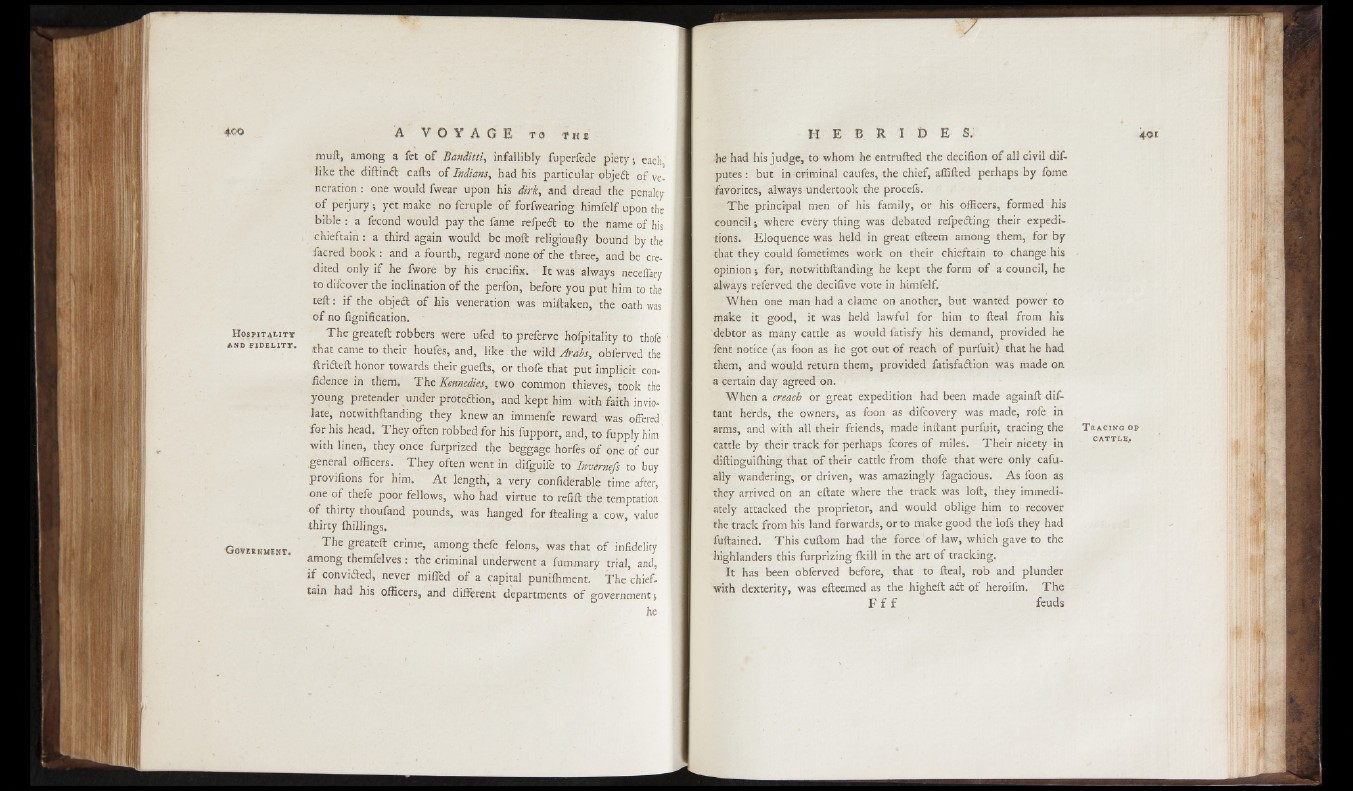
H o s p i t a l i t y
AND F IDEL IT Y *
G o v e r n m e n t .
mull, among a fet of Banditti, infallibly fuperfede piety s each
like the diftinft calls o f Indians, had his particular objeit of veneration
: one would fwear upon his dirk, and dread the penalty
of perjury; yet make no fcruple o f forfwearing himfelf upon the
bible: a fecond would pay the fame refpeit to the name of his
chieftain : a third again would be moft religioufly bound by the
facred book : and a fourth, regard none of the three, and be credited
only if he fwore by his crucifix. It was always necefiary
to difcover the inclination of the perfon, before you put him to the
te ll: if the objedt o f his veneration was miftaken, the oath was
of no fignification.
The greatell robbers were ufed to preferve hofpitality to thofe
that came to their houles, and, like, the wild Arab a, oblerved the
itriitelt honor towards their guells, or thole that put implicit confidence
in them. The Kennedies, two common thieves, took the
young pretender under protection, and kept him with faith inviolate,
notwithllanding they knew an immenfe reward was offered
for his head. They often robbed for his fupport, and, to fupply him
with linen, they once furprized the beggage horfes o f one of our
general officers. They often went in difguife to Invernefs to buy
provifions for him. A t length, a very confiderable time after,
one o f thefe poor fellows, who had virtue to refill the temptation
o f thirty thoufand pounds, was hanged for Healing a cow, value
thirty ffiillings.
The greatell crime, among thele felons, was that o f infidelity
among themfelves : the criminal underwent a fummary trial, and,
i f conviiled, never miffed o f a capital punilhment. The chieftain
had his officers, and different departments o f government *
he
he had his judge, to whom he entrufted the decifion o f all civil disputes
: but in criminal caufes, the chief, affilted perhaps by fome
favorites, always undertook the procefs.
The principal men of his family, or his officers, formed his
council; where every thing was debated reipeiling their expeditions.
Eloquence was held in great elteem among them, for by
that they could ibmetimes work on their chieftain to change his
opinion ■, for, notwithllanding he kept the form o f a council, he
always referved the decifive vote in himfelf.
When one man had a clame on another, but wanted power to
make it good, it was held lawful for him to ileal from his
debtor as many cattle as would fatisfy his demand, provided he
lent notice (as foon as he got out of reach of purfuit), that he had
them, and would return them, provided fatisfadion was made on
a certain day agreed on.
When a creacb or great expedition had been made againll distant
herds, the owners, as foon as difcovery was made, rofe in
arms, and with all their friends, made inftant purfuit, tracing the
cattle by their track for perhaps fcores of miles. Their nicety in
dillinguiffiing that of their cattle from thofe that were only cafu-
ally wandering, or driven, was amazingly fagacious. As foon as
they arrived on an eftate where the track was loft, they immediately
attacked the proprietor, and would oblige him to recover
the track from his land forwards, or to make good the lofs they had
fuftained. This cuftom had the force of law, which gave to the
highlanders this furprizing Ikill in the art of tracking.
It has been obferved before, that to Heal, rob and plunder
with dexterity, was efteemed as the highell ad of heroifm. The
F f f feuds
T r a c i n g o p
c a t t l e .*